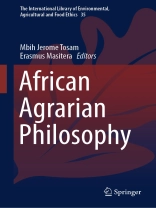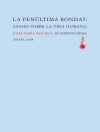This book explores indigenous sub-Saharan African agrarian thought. Indigenous African agrarian philosophy is an uncharted and largely overlooked area of study in the burgeoning fields of African philosophy and philosophy of nature. The book shows that wherever human beings have lived, they have been preoccupied with exploring ways to ensure the sustainable management of limited resources at their disposal, to attain to their basic needs: food, shelter, and security. The book also shows that agriculture and the way people relate with nature are an essential, but generally neglected, determinant of the emergence and orientation of all philosophical traditions. In traditional, pre-colonial African culture, it was difficult to separate agriculture from African relational ontology. Agriculture and the use of natural resources were at the centre of community life and influenced the social, political, economic, and spiritual worldviews of the people. In their contact with nature through agriculture, different beliefs, knowledge systems, norms, moral outlooks, cultural practices and institutions emerged and have been valorized to guide societies on how to sustainably manage the environment. As a way of life, then, agriculture was deeply connected with indigenous beliefs, values, and practices which transcended a wide range of issues related to ecological ethics, food ethics, religion, traditional medicine, political economy, social organisation, biological reproduction and species survival, indigenous knowledge, and property rights. This book will thus be a valuable resource for policy makers and researchers in diverse fields such as philosophy, geography, sociology, anthropology, and development studies.
Jadual kandungan
Murimi munhu: A quest for decoloniality in ‘small scale’ subsistence farming in Zimbabwe.- The Kom Trilogic Worldview and Agrarian Philosophy.- Human Relation to Nature and African Agrarianism.- Manifestations of Bekwarra Agwunihe Philosophy in Land Ownership and Agricultural Practices.- The Confluence of African Agrarianism and Permaculture: Some Observations and Implications.- Bekwarra Communal Values, Food Ethics and Folkloric Conception and Interpretations of Animal-Human Relations.- Agrarian philosophy, community and Adam Smith: African agrarian economics.- Unpacking Ndebele agrarian metaphors for the promotion and preservation of communal social development.- The religious significance of mushrooms among the Shona people of Zimbabwe: An Ethnomycological approach.- In search for a pedagogy of African agrarian philosophy.- The Shona ‘Zunderamambo’ (agricultural welfare system) as a model for social responsibility: A task for higher education systems.- Julius Nyerere’s Ujamaa as an agricentric Philosophy of Education: A Response to the crises of education in Africa.- Contemporary challenges in the development and use of agrarian communities’ local indigenous knowledge and practices for sustainable agriculture and climate adaptation: The Case of North West Cameroon.- Necessity Is The Mother Of Invention: Famine-induced Adoption Of Conservation Farming “Dhiga-hudye/Dig and eat” In Chivi Communal Lands Of Zimbabwe.- The practice of African traditional medicine and agrarianism in Zimbabwe: The Quest for this Karanga Agrarian Practice in Madamombe area of Chivi District.- Land Ethics among the Traditional Annangs of Southern Nigeria: Traditional Environmental Ethics, Challenging Contemporary Hostilities towards our Planet.- The Farm-Village Practice of Yorubas in West-Central Africa.- An Historical Appraisal of the Fig Tree (Ghim) and Dracaena (Nkeng nkeng) in Traditional Rulership of Bali Chamba Polities.- Towards Sensitising and Reorienting Contemporary Bekwarra against Deforestation: Prospects and Challenges.- African Endogenous Knowledge and Sustainable Development: Evolving an African Agrarian Philosophy.- Shangwe Environmental Ethics: A Panacea for Agrarian Problems in Gokwe.- Indigenous knowledge and agro-based livelihood dynamics in the Western Highlands of Cameroon.- Agrarian Rituals, Food Security and Environmental Protection in the Bamenda Grassfields of Cameroon.- Indigenous African Eco-communitarian, Agrarian Philosophy: Lessons on Environmental Conservation and Sustainability from the Nso culture of North West Cameroon.- ‘Defending a Relational Account of Animal Moral Status’.- Farming and Animals Welfare in the African Context.- The Inseparable Connection between African Metaphysics and African Agrarian Philosophy.- The Phenomenon of Male and Female Crops and Gender Equality in Igbo-African Agrarian Culture.- The Farm in Colonial and Postindependence Imagination: A Crisis of Continuity.- Conceptual frameworks for an African Sustainable Agriculture: Beyond John Locke, the Cold War and the Scramble of World Religions.- Henry Odera Oruka’s Parental Earth Ethics as ethics of duty towards ecological fairness and global justice.- Socio-economic practices and pseudo-prosperity in the cocoa producing village of Bombe Bakundu (Cameroon), 1945-2000.- Food Security as a Fundamental Human Right: A Philosophical Consideration from Africa.- Consumer Activism: Towards Redirecting the Moral economy of Food.- Rethinking Shangwe Traditional Philosophy in Resolving Agrarian Wrangles in Contemporary Gokwe Communities.
Mengenai Pengarang
Mbih Jerome Tosam is Associate Professor of Philosophy at the University of Bamenda, Cameroon. He obtained his Ph.D. in Philosophy from the University of Yaoundé I, Cameroon, in 2011. He is former Chair of the Department of Philosophy at the Higher Teacher Training College (HTTC), Bambili (2011–2017) and the Faculty of Arts of the University of Bamenda, Cameroon (2017–2021). His research interests are in the areas of Bioethics, African Philosophy, and Intercultural philosophy. Some of his publications have appeared in the following journals: South African Journal of Philosophy, Annali di studi religiosi, Medicine, Health Care and Philosophy: A European Journal, Developing World Bioethics, Journal of World Philosophies, and Polylog: Forum for Intercultural Philosophy.
Erasmus Masitera (June 3 1979- March 1 2022) was a senior lecturer in Philosophy in the Department of Philosophy and Religious Studies at Great Zimbabwe University, Masvingo, Zimbabwe. At the time of his demise, he was a postdoctoral fellow at the University of the Free State, South Africa. His research areas revolved around the connections of Ethics, Ubuntu, land reform, and social justice.












